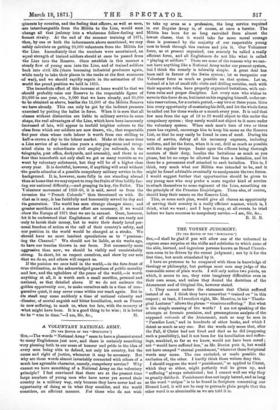VOLUNTARY NATIONAL ARMY.
[TO THE EDITOR OF THE "SPECTATOR,"]
sSIR,—The words "National Army" seem to have a pleasant sound to many Englishmen just now, and there is certainly something aiery pleasing both to our sense of honour and pride in the idea of -every man being able to defend, not only his country, but the -cause and right of justice, whenever it may be necessary. But why are these words almost invariably connected with others of a much less agreeable character, namely, compulsory service? Why -cannot we have something of a National Army on the voluntary principle? I feel convinced that there are at the present time large numbers of young men who have never yet served their country in a military way, only because they have never had an opportunity of doing so in what they consider, and the world considers, an efficient manner. For those who do not wish
to take up arms as a profession, the long service required in our Regular Army is, of course, at once a barrier. The Militia has been for so long recruited from almost the lowest classes, that it would take far more moral courage than is possessed by the majority of oar respectable young men to break through this custom and join it. Our Volunteer force, as at present organized, can scarcely be called a really efficient force, and all Englishmen do not like what is called "playing at soldiers." These are some of the reasons why we can- not have anything like a National Army under our present system, but I think the remedy is tolerably simple. A great deal has been said in favour of the Swiss system ; let us reorganize our Volunteer force as much as possible on that system. Let us, instead of a lot of small rifle clubs and drilling societies, each with their separate rules, have properly organized battalions, with uni- form rules and proper discipline. Let every man who wialies to serve in this force do so, but insist on his engaging himself, under cer- tain reservations, for a certain period, —say two or three years. Give him every opportunity of mastering his drill, and let the whole force be called out for three weeks or a month every year. It is said that few men from the age of 18 to 22 would object to this under the compulsory system ; they surely would not object to it more under the voluntary system. When each man's turn of two or three years has expired, encourage him to keep his name on the Reserve List, so that he may easily be found in case of need. During his term of service, defray all his necessary expenses, including uniform, and let the force, when it is out, drill as much as possible with the regular troops. Insist upon the officers being thorough masters of their duty, localize the battalions as much as you please, but let no corps be allowed less than a battalion, and let there be a permanent staff attached to each battalion. This is, I think, very much what our Militia was intended to be, and it might be found advisable eventually to amalgamate the two forces. I would suggest further that opportunities should be given to any young men who may prefer a more regular kind of service to attach themselves to some regiment of the Line, something on the principle of the Prussian Einjiihrigen. These also, of course, should keep their names on the Reserve List.
This, or some such plan, would give all classes an opportunity of serving their country in a really efficient manner, which is, I think, what we want ; and I hope it may, at all events, be tried before we have recourse to compulsory service.—I am, Sir, &c..
R. II. B.


































 Previous page
Previous page